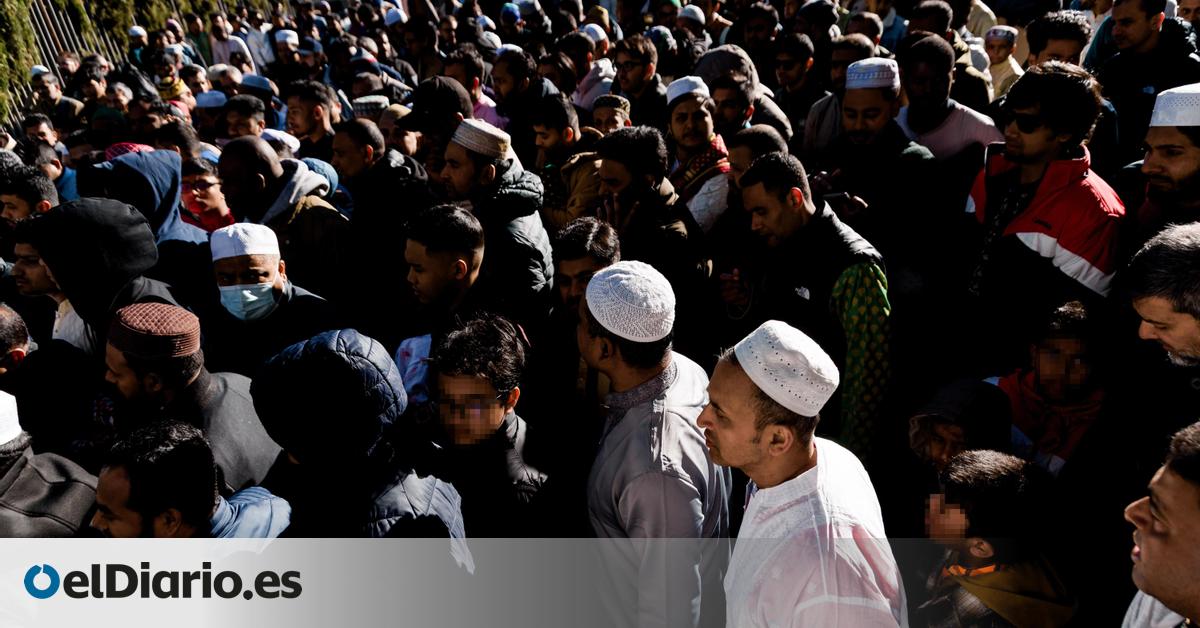
And suddenly, anti -immigration discourse was institutionalized. The verbal climbing of the PP and Vox on the people of foreigner’s origin climbed this week in Jumilla, a municipality of just over 27,000 inhabitants in the Region of Murcia, whose City Council has promoted the veto of Islamic prayers in municipal public spaces. The decision is not only a jump from the discursive to the normative, but also implies opening the focus of the signal. They are no longer immigrants, whatever their legal situation, but Muslims as a synonym for what is not or should not be, in essence, Spanish. As much as many of those Muslims have been born and grown in Spain.
“Yes! We must protect the public spaces of practices outside our culture and our way of life. We must protect the Spaniards of those who seek to impose a totalitarian ideology, sometimes disguised as a religion,” the Vox leader celebrated in social networks the decision of a session governed by the PP. From the total population of Jumilla, it is estimated that some 3,000 people profess the Muslim faith, many of them full Spanish citizens. During the last two decades, the Islamic community of the town had requested and accessed the municipal sports center for the prayers of the end of Ramadan and the Lamb Festival, two days a year in which there was never, as recorded, incident of any coexistence.
“People are very surprised. For more than 20 years the Muslim community rents and pays for the use of the sports pavilion for prayer for half an hour in two festivities. Two a half hours a year! Imagine the problem that this supposes for the administration,” says Mounir Benjelloun, the president of the Federation of Islamic entities, who only finds an explanation to the decision of the City Council. “The issue is to create a conflict where there is not, that there is controversy, that there is a reaction. What they want is to reach Torre Pacheco, that everything that is Muslim suffers persecution, to put our life more difficult for that social conflict and that hatred to be generated in search of votes.”
While the extreme right celebrates the conquest of that qualitative leap that the left closers “institutional Islamophobia”, in the PP They strive to mask the measure promoted from a town hall that govern alone. “It is false that the Popular Party will point to anyone for its creed, because it is absolutely unacceptable that it is intended to pass to the Popular Party for a Xenophobic Party,” said the Deputy Secretary of Education and Equality of the popular, Jaime de los Santos.
However, this Friday the PP spokesman in the Parliament of Catalonia, Juan Fernández, was openly “in favor” of the decision of the City of Jumilla (Murcia) to prohibit the celebration of Islamic religious acts in municipal sports center, a measure on which he expressed his “respect and support.” “In Spain we must have an integrative model and it is not a criticism, it is one in favor of what is taking place in Jumilla and one in favor of controlling according to what celebrations,” he added. Fernández went further and charged against the “traditions that threaten freedom of expression and freedom and dignity of women”, as, in his opinion, the Islamic veil is, and urged “putting up to these practices.”
The mayor of Jumilla, of the PP, came to cancel the press conference scheduled this week before the controversy generated. To questions from the press, Seve González blames the commotion to “an interested misrepresentation” and argues that in Jumilla the freedom of worship “without vetoes or prohibition to anyone for their religious origin” is guaranteed. But the truth is that its decision has come to the Popular Party even in a shock situation with the Catholic Church.
“Public religious manifestations, understood as freedom of worship, are protected by the right to religious freedom, a fundamental human right protected by the Constitution,” recalled the Episcopal Conference in a statement in which the decision adopted is qualified as “unacceptable”. “The limitation of these rights attempts against the fundamental rights of any human being, and does not only affect a religious group, but all religious confessions and also non -believers. Making these restrictions for religious reasons is a discrimination that cannot occur in democratic societies,” conclude the Spanish bishops.
The motion that will prevent the Muslim community from continuing to celebrate events such as the end of Ramadan or the Lamb Festival in the local sports facilities was approved by the majority of the PP on July 28. The finally approved text is the result of an amendment presented by the party of Alberto Núñez Feijóo to an initial text of the extreme right -wing formation containing an alleged defense of the “traditions” of the Spanish people.
This text described as “cultural setback” and “comparative grievance towards those who retain Spanish traditions” the “development on Spanish soil” of these Islamic festivities and asked to “ban” their “public celebration.” The PP, which could reject the initiative flat, chose to present an amendment that although it is not explicit in its rejection of these Islamic acts, does maintain its spirit and maintains the specific restriction of the use of municipal sports facilities for purposes outside the City Council.
The proposal finally approved eliminates up to six points of the Vox motion, but maintains the article that allows the Muslim community to continue to celebrate the end of Ramadan and the ‘Lamb Festival’ in those facilities. According to the PP, the passages eliminated although they pursued “the legitimate purpose of protecting” the Spanish “traditions and customs” could “give rise to interpretations that do not fully adjust to the current legal framework.”
Actually, the hard speech of the PP in immigration matters already uploaded several steps just a year ago by the hand of its own leader, Alberto Núñez Feijóo, which has been delivered to the linking of insecurity with the foreign population against what the data reflects. Feijóo has come to relate illegal occupations or crime with the foreign population. Although the data reflect just the opposite. According to figures from the Ministry of Interior, people of foreign nationality were 3.7 million in 2005 and today there are 7 million. And the crime rate is 9 points lower since then.
In spite of this, the PP has tightened in this last political course its immigration discourse, with the milestone of the distribution of the minors of the Canary Islands, whose foster care has been presented from the beginning as an unwanted problem by the autonomous communities, most of which are governed by the Popular Party.
After the riots and “hunting the immigrant” in Torre Pacheco this summer, Feijóo did not face the xenophobic discourse. During a course of the CEU San Pablo University, in fact, he came to ensure that “immigration does not give white letter to commit crimes” and that in Torre Pacheco there is “a level of crime much higher than average” because “there are immigrants who do not work, young people who do not want to work or study”.
The crime rate in that Murcian town is on average and are the most populated cities in Spain where more crimes are committed. According to the last Julio CIS, the Spaniards consider immigration the fifth of the “problems” that affect them, behind economic matters, housing, health and unemployment.
Source: www.eldiario.es

